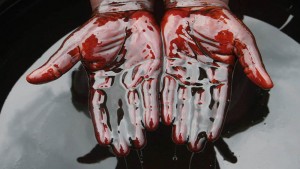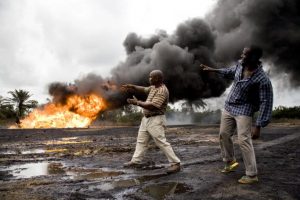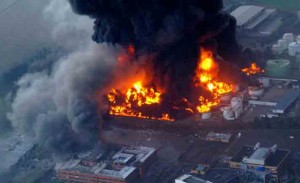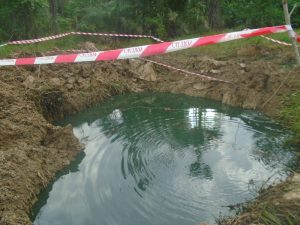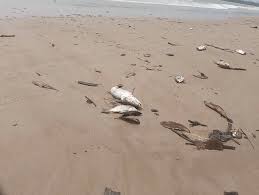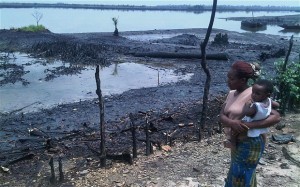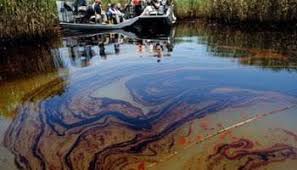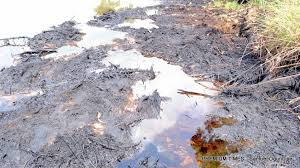

Care-free Oil Spills In The Niger Delta As Challenge To Global Goals, Negative Prop To Climate Change
FeaturedSpecial Reports May 10, 2021 Victor Onyeka-Ben

By Victor Onyeka-Ben
Even as the rest of the world continues to make frantic efforts to protect the natural ecosystem in line with the United Nations Sustainable goals adopted in 2015, the activities of multinational oil companies in Nigeria’s oil-rich but exploited Niger Delta region, portray them as all for profit and care-free about the results of the incessant pollution of the environment orchestrated by their operations. The result is that not only is the economic life of the host communities of the oil companies being destroyed systematically, the global effort at building a sustainable future is equally being made mirage.
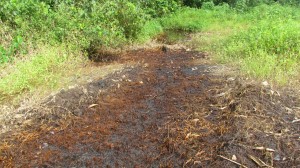
Site of an on-going oil spill at Osiama oil field operated by Nigerian AGIP Oil Company (NAOC) in Southern Ijaw Local Government Area, Bayelsa State.
The Sustainable Development Goals (SDGs) or Global Goals are a collection of 17 interlinked global goals designed to be a “blueprint to achieve a better and more sustainable future for all”. As articulated in 2015, the SDGs were set up by the United Nations General Assembly and are intended to be achieved by the year 2030. The goals are included in a UN Resolution called the 2030 Agenda or what is commonly known as Agenda 2030. The SDGs were developed in the Post-2015 Development Agenda as the future global development framework to succeed the Millennium Development Goals which ended in 2015.
Specifically, the 17 SDGs are: (1) No Poverty, (2) Zero Hunger, (3) Good Health and Well-being, (4) Quality Education, (5) Gender Equality, (6) Clean Water and Sanitation, (7) Affordable and Clean Energy, (8) Decent Work and Economic Growth, (9) Industry, Innovation and Infrastructure, (10) Reducing Inequality, (11) Sustainable Cities and Communities, (12) Responsible Consumption and Production, (13) Climate Action, (14) Life Below Water, (15) Life On Land, (16) Peace, Justice, and Strong Institutions, (17) Partnerships for the Goals.
Taking cognizance of the SDGs, it would appear as if the multi-national oil companies operating in Nigeria’s Niger Delta region are assiduously working in the breach of the goals as their activities reveal hereunder.
In April 2020 for instance, Mr Iniruo Wills, an environmental rights crusader and Ex-Environment Commissioner in Nigeria’s Bayelsa State called on oil industry regulators to prioritize the investigation of increased toxicity of the country’s Atlantic coastline causing massive death of fauna and flora. This is in spite of the fact that the livelihood of the indigenous people living on the coastline depends on fishing.
Wills who made the call in an interview in the state capital, Yenagoa in reaction to dead fishes littering the coastline across Nigeria’s Delta, Bayelsa and Rivers States, noted that continual massive death of fishes within Nigerian territorial waters for one month running was an indication of severe underlying factors from oil installations.
He implored the country’s National Oil Spills Detection and Response Agency (NOSDRA) to urgently trace the source of the pollution amid the COVID-19 pandemic to safeguard public health.
According to him, the source of the pollution could be traced urgently since the oil and gas sector was categorized as essential services by the government and therefore exempt from the COVID-19 induced lockdown and especially as oil production and export was not shut down.
Chevron, First Exploration and Production, Consolidated Oil all operate platforms in the shallow offshore oilfields off the Bayelsa coast, while Shell, Agip and Aiteo operate onshore fields in the swamps of Bayelsa.
But despite the independent confirmation of the spill and the resultant floating of dead fish along the coastlines of the affected states, Chevron Nigeria, an affiliate of a United States energy firm which operates oilfields near the coastline, while responding to a request for reaction across operators, told www.Africanewscircle.com that there were no leaks from its facilities in the area. The company’s spokesman, Mr Esimaje Brikinn, denied any links between the alleged pollution and the operations of the oil firm.
“CNL and Star Deep confirm that there has not been any chemical release from any of our facilities,” the Chevron spokesman stated in characteristic denial.
However, www.Africanewscircle.com learnt that First Exploration and Production, an indigenous oil firm which acquired Oil Mining Leases 83 and 85 when Chevron divested in 2015 from Ayala and Madu fields have been conducting drilling campaigns to bring the fields to production. The oil firms declined comments on the impact of on-going oil exploration activities on its operational area and adjourning Atlantic coastline settlements where dead fishes floated over a prolonged period of time.
In June, 2018, Dr Simon Amaduoboha, a Senior Lecturer at the Niger Delta University in Bayelsa State decried the poor attitude to the environment and lack of remediation projects to cushion the adverse impacts of oil exploration in the Niger Delta region.
Amaduoboha spoke at the opening of a two-day youth training on environmental laws, rights and conventions organized in Yenagoa to empower youths between the ages of 13 and 20 with requisite knowledge of laws at an early stage to appreciate the need for conservation and protection of the environment.
Back in October 2016, King Bubaraye Dakolo, Paramount Ruler of Ekpetiama community in Yenagoa, Bayelsa State blamed the widespread pollution of the Niger Delta environment to weak regulatory framework.
Dakolo expressed the view in his palace during an advocacy visit by the environmental rights group, Environmental Rights Action/Friends of the Earth Nigeria (ERA/FoEN).
He regretted that the transnational oil firms with operations in many countries including their home countries, comply with environmental procedures for sustainability of the environment in those countries but flout such rules in Nigeria.
His words: “We are all witnesses to recent occurrences in the Gulf of Mexico and the steps taken to remediate the environment and compensate the victims, but the same companies cannot do the same here because of weak regulation. There is apparent laxity in the regulation of the oil sector that transnational companies are exploiting to the detriment of our environment, in their home countries they dare not spill a barrel because they know the implication.”
“But the story is different in Nigeria and in the Niger Delta, the government needs to urgently strengthen the regulators and equip them to play their roles and protect the ecosystem,” Dakolo said.
Earlier, Mr Alagoa Morris, Head of Field Operations at ERA/FoEN sought the support of the traditional ruler in the group’s bid to monitor the environmental impact of oil and gas explorations in the Ekpetiama communities.
Morris urged the royal father who is also an environmentalist to support the NGO’s advocacy to stop indiscriminate and illegal logging in the Niger Delta as well as notify ERA/FoEN of pollution incidents at oilfields in Ekpetiama.
In March, 2015, Shell confirmed oil leaks from its underwater facility in Bayelsa State as residents lamented the pollution of the Ogboinbiri River. According to a late statement issued by Mr Joesph Obari, spokesperson of the oil firm, the leakage was reported on January 23, 2015, and was subsequently shut.
A site visit however showed that residual leak from Seibou Deep facility operated by SPDC, has been discharging crude into Ogboinbiri River in Bayelsa.
“A spill was detected from an underwater flow line riser at the Seibou 2 Wellhead in the night of January 23, 2015.
“The well was closed-in about fifteen hours later, once it was safe to do so and the impacted area boomed off to prevent further spread of the spill.
“A Joint Investigation Visit (JIV) has been conducted, but it only determined the quantity of oil spilled and mapped the area of impact to the environment.
“A follow up JIV is being planned to lift the line from underwater and determine the cause of leak,” the SPDC stated when it pleased the company to clarify.
Residents in the coastal settlements in Ogboinbiri and neigbouring communities say the oil leak had damaged the fishing activities of the people.
Some residents who depend on the river for drinking and domestic use say that the leak had continued unabated for over a month, compelling them to resort to sachet water.
Our Correspondent who visited the spill site observed that movement of boats along the waterways distorted the plastic materials used to trap the spilled crude. The surface of the river was covered by crude deposits flowing down the waterways. Keme-Ebiama, Apoi, Kokologbene, Gbaruan, Ukubie, Lobia communities were the worst hit.
It was gathered that several communities along Ogboinbiri River bank have also been affected; with the water current aiding the dispersal of the crude oil.
Chief Columbus John-Bull, Chairman of the Community Development Committee (CDC) of Keme-Ebiama community said that the spill had deprived them of their source of water for drinking and domestic use.
“This major spill started a long time ago like a small leak but has turned a serious issue by 15 February at the Seibou 2 facility of Shell at Ogboinbiri. The spill first affected rivers in the Ogboinbiri axis before spreading to other communities; the volume of crude oil was really heavy. It covered the whole of our river. It was so devastating that our people could no longer go to the river and take their bath or fetch drinking water.
“Due to the heavy pollution and resultant scarcity of drinking water, the cost of water a sachet of water in the community rose from N10.00 to N30.00. Most of our people cannot afford the sachet water at that price. We are very much worried of what the situation might lead to considering the recent outbreak of cholera in some communities in the local government area,” John-Bull said.
The community leader therefore urged the management of SPDC to take responsibility for the incident and dispatch relief materials and medical team to forestall the breakout of epidemics in the area. He also urged the oil firm to compensate communities and individuals impacted by the oil leak for the losses they incurred as a result of the incident.
Mr Iniruo Wills, the Bayelsa Commissioner for Environment, also confirmed the development then and said plans were underway to respond to the challenges faced by the coastal communities as a result of oil production.
Wills explained that the Bayelsa Ministry of Environment had summoned officials of the oil firm to a meeting to map out plans to mitigate the spill impact.
“We have invited Shell for a meeting on Tuesday to deal with this spill. In the meantime, we are asking all parties to do everything necessary to ensure quick containment and clean up. The Bayelsa state government through the Ministry of Environment and other relevant agencies will be taking steps that will ensure severe sanctions for oil pollution, whoever the culprits,” Wills said.
On their part, some residents of Ikarama community in Yenagoa Local Government Area of Bayelsa also lamented the adverse impact of an oil leak from a nearby oilfield. The people advocated remediation of oil pollution from the April 7 leak from Shell’s 14-inch Okordia-Rumekpe pipeline which discharged crude into the ecosystem.
The Okordia-Rumekpe crude trunk line, is part of the Trans Niger Pipeline (TNP) operated by Shell Petroleum Development Company (SPDC) and conveys crude to the oil firm’s crude export terminal at Bonny in Rivers State.
It was learnt from a Joint Investigation Visit (JIV) report that the leak was traced to equipment failure which emanated from a rupture on the 14-inch crude delivery line.
JIV is a statutory probe into the cause of any recorded spill incident involving the oil firm, regulators, host communities and state ministries of environment. Unfortunately, far reaching actions to stop the spills are hardly taken making the problem to persist in all the oil producing states of the Niger Delta.
The JIV report indicated that some 213 barrels which leaked from its asset had no impact on the environment outside SPDC’s right of way, while approximately 110 barrels polluted 1.34 hectares of land.
Residents near the spill impacted site lamented that they have suffered untold hardship from the pollution of land, air and lakes near the area due to the evaporation of the leaked crude by the scorching sun.
Mr Education Ikiowori, who works at the Ikarama oilfields and witnessed the JIV said the spill was as a result of corrosion. He said that Shell and the regulators had visited and excavated the place in search of the cause of the spill.
“They all saw that the rupture was caused by corrosion, yet Shell disagreed. Normally SPDC when they come even if the spill was caused by corrosion; they would try to influence it in their favour by saying it was caused by a third party so as to avoid responsibility to the landowners. For this one, thank God that it was very obvious that it was equipment failure; as the government representatives and regulators and all who were here confirmed it,” he said.
Chief Washington Odoyibo said that residents have been experiencing the antics of Shell which according to him, is usually attributing every spill incident to sabotage each time it happened.
“When the spill occurred at this place in November 2019 during the flood, Shell came here and turned it to sabotage. This pipeline is over 40 years, I was a child when they laid this pipe here, but they refused to replace it and it is failing every now and then,” Odoyibo said.
The community leader also dismissed the claim by SPDC that some 213 barrels that spilled into the environment has no impact and wondered if the area where the 213 barrels of crude leaked into was isolated from the rest of the environment.
He explained that due to the high intensity of the sun the leaked crude evaporates into the air and cause choking sensation that triggers cough and respiratory difficulties amongst the people.
He said the people of Ikarama were in dire need of medical intervention following the pollution of the air, water and land as well as relief materials.
“When our people inhale this crude oil, in a short while one can come down with cough. This crude oil can give different kinds of sicknesses; cough, running nose and so on.
“So, this thing is affecting us. Besides that, if we go inside this our swamp here; you would see different kinds of dead fish because of this spill. Fishponds have been destroyed’’ he added.
SPDC’s Media Relations Manager, Mr Bamidele Odugbesan, who confirmed the leakage, pledged to issue a statement on the incident and steps taken to mitigate the pollution, but has yet to do so.
Earlier in April, the Shell Petroleum Development Company (SPDC) confirmed an oil leak incident from its facility at Agbura-Otuokpoti axis in Yenagoa Local Government Area of Bayelsa as impacted communities lamented the negative impact of the oil discharged by the spill. Whereas SPDC claims to have responded swiftly, residents say that days after the incident, spill response was yet to begin.
But in a response to a request for reaction on the incident, Odugbesan, the SPDC’s spokesman said that the oil firm got a report of the leak incident on March 31.
“At about 8.30am on 31 March 2021, a community surveillance vendor reported a leak on The Shell Petroleum Development Company Limited (SPDC) Joint Venture pipeline at the Nun River in Bayelsa State following which the facility was shut down and full isolation established at 09.45am.
“The SPDC Oil Spill Response Team was mobilised to the spill site and was able to contain the spill to prevent further spread. The Joint Investigation Visit team led by the government regulator will determine the cause of the spill and the impact, though there was an anonymous note found at the spill site suggesting sabotage,” Odugbesan said in a twist.
The residents of the area confirmed that the leakage discharged large volumes of crude oil into the river resulting in the pollution of the waters which the predominantly fishing and farming settlements depend on.
Mr Collins Jackson, an environmentalist said the spill was discovered in the early hours of the day, when the people noticed large volumes of crude oil floating on the rivers.
Jackson who dismissed the claims of prompt response by the oil firm and the suggestion of sabotage, said that he visited the incident site with members of the community and did not find any oil worker whilst the oil discharge was going on.
“The claim of an anonymous note suggesting sabotage is at best a fallacy because we visited the place immediately our people noticed oil on water and we did not see any note. Why will SPDC jump into conclusions when the investigation has not been concluded? The theory of sabotage is funny because the pipeline is corroded and has signs of loss of integrity due to age, and the site is close to the security outpost so the possibility of a vandal gaining access is very slim.
“The position that the spill might be a case of sabotage was discarded when we later got to the spill point and the pipeline was found to be corroded and we disagreed that this is clearly equipment failure. That is why there is a disagreement that is yet to be resolved amongst the regulators, communities and state government officials working on the Joint Investigation,” Jackson said.
Chief Don-Evarada Abednego, a resident of Otuokpoti condemned the insensitive posture of the oil firm to the plight of the people in the affected communities adding that emergency relief to the people ought to be the priority of SPDC. He described the spill as ‘life threatening’ since the community lacks basic amenities such as a healthcare facility and portable drinking water adding that drinking the polluted water would jeopardize public health.
Also, Alagoa Morris an environmental activist and Head of Field Operations at Environmental Rights Action who visited the spill site, said that the response personnel claimed to have been deployed were yet to arrive the polluted site at the time of his visit.
He described the incident as a major spill and called on regulators to swing into action to contain the situation and follow up with immediate clean up exercise.
It would be recalled that in April this year, the Rivers state Governor, Nyesom Wike, underscored the lack of commitment to a clean environment by the oil companies and advised Nigeria’s Federal Government not to politicize the implementation of the alternative livelihood component of the United Nation Environment Programme (UNEP) recommendations on the Ogoni clean up after years of extreme oil pollution. He said that his administration is ready to partner with the Federal Ministry of Environment and Hydrocarbon Pollution Remediation Project (HYPREP) to improve the living condition of the Ogoni people after years of environmental degradation. Wike made the call during a courtesy call by the Minister of Environment, Dr Mohammad Mahmood Abukabar and new members of HYPREP board of trustees at the Government House, Port Harcourt.
In February, Environmentalists and residents raised concerns over the dangers faced by residents near the Ogboinbiri Oilfield operated by Nigeria Agip Oil Company (NAOC) in Southern Ijaw Local government Area of Bayelsa State.
Residents from the area fled their homes following the pungent odor from gas leaks which polluted the air as a result of the ‘production flare’ that is meant to burn off excess gas and reduce pressure in the oil and gas facility. According to them, the huge balls of flames emitted unbearable heat which compelled them to leave their residences.
Tiedor Duabor who resides in the area said that high temperature from the flares forced him and family to leave their abode at a nearby fishing port.
“It has not been easy here. Sometimes in the night when they flare everywhere will be full of light and you cannot sleep. On Monday the heat was something else, we had to hurry and run for our lives,” Tiedor said.
The Environmental Rights Action/Friends of the Earth Nigeria (ERA/FoEN) in a field report noted that the continued pollution by gas leakages and excessive flares have degraded the quality of air in the area.
According to the report signed by Mr Alagoa Morris, Head of Field operations at ERA/FoEN, the safety of Ogboinbiri community where the natives are daily exposed to gas flaring from flow stations in the area operated by NAOC has been compromised.
The group therefore urged the federal government to conduct an environmental audit or post impact assessment of the community, to be funded by the operator of the field.
ERA/FoEN described the Ogboinbiri situation as pathetic due to the intensity of the roaring flares from the two vertical gas flare stacks in the area which sometimes causes panic among the natives.
The report stated that the residents of the area also face extreme heat, buildings vibrating, pollution of their source of drinking water, destruction of roofing sheets and health concerns among others.
“It is, however, unfortunate that people living in a community like Ogboinbiri that is so close to two vertical gas flare stacks burning daily, cannot access the medical facility in the community due to the high cost of medical services and drugs. The main community where people live is approximately about 600-800 meters from the vertical gas flare stacks.
“Ordinarily these victims of Agip’s illegal flaring of gas ought to be given special medical attention and properly relocated within the community environment; as was the case of Finima and the Liquefied Natural Gas (LNG) in Bonny, Rivers State. This is even more so, considering the life threatening overflowing of the gas and vibrations at the flare site so nearby. Where there is a sense of social and environmental justice, the people of Ogboinbiri cannot be left the way they are left behind.
“The Ogboinbiri oilfield is within OML 63 and the Nigerian Agip Oil Company Limited has been exploiting crude oil and gas from the community environment since the Ogboinbiri Flow Station was established in the late 1980s. Presently the Ogboinbiri oilfield has 17 viable or functional oil wells, from which Agip has continued to extract crude oil and gas till date, producing 50,000 bbls/d (fifty thousand barrels of crude oil per day) and 180 million cubic feet of gas daily.
“With all the resources taken daily from the community by Agip and NNPC Joint venture and 13 per cent derivation accruing monthly to Bayelsa State, it is unthinkable that such a community is denied portable water and affordable health facilities. This is alienation by the government and it is simply unjust,” the report read in part.
Public Affairs officials at Eni, the parent company of NAOC declined to comment on the reported indiscriminate flares and gas leaks by members of its host community when contacted for response.
In furtherance to the implementation of the recommendations contained in the UNEP report for alternative livelihood for Ogoni women who are to be trained in agribusiness at Songhai farms in Rivers State, the governor suggested that the Federal Government should ensure that those scheduled for the training are truly indigenes of Ogoni.
It is no wonder that the Artisanal Fishermen Association of Nigeria (ARFAN), loudly applauded the recent Dutch Court ruling that found Shell liable of polluting the farmlands and fishing areas of four farming communities in the Niger Delta. The group urged the oil firm which lost the case at appeal to consider complying with the judgement and compensate the farmers and remediate the polluted environment as ordered by the Dutch Appeal Court. A Dutch court had in January ordered the Nigerian subsidiary of Shell, to pay compensation over the 2008 oil spills in Oruma, Bayelsa State, Goi in Rivers State and Ikot Ada Udo, in Akwa Ibom State.
Four farmers had dragged Shell to a Dutch court over a 2008 oil spillage that adversely affected their farms. The Court of Appeal in The Hague, ruled that the Nigerian arm of the British-Dutch company, SPDC should compensate the farmers and clean-up the pollution from its leaking oil pipelines and install anti-leak devices on them.
Reacting to the judgement in Yenagoa, Rev. Samuel Ayadi Coordinator of ARFAN in the Niger Delta noted that the triumph of the farmers in a Dutch court was heartwarming. He said that the litigation brings to mind the damage and impact of the 2011 Bonga oilfields spill which ironically led to the extinction of the Bonga fish specie after which the oil facility was named.
Ayadi lamented that the refusal of Shell to compensate fishermen for losses incurred after the spill polluted the Atlantic ocean was regrettable.
According to him, the intervention of President Muhamadu Buhari to prevail on Shell to abide by court judgements has become necessary to save the agricultural sector from the dangers posed by oil pollution.
He noted that the National Oil Spills Detection and Response Agency (NOSDRA) had acted in good faith and imposed fines on Shell which refused to pay and unsuccessfully challenged the fine in court.
Ayadi appealed to the government to prevail on Shell Nigeria Exploration and Production Company (SNEPCO), to pay the $3.6 billion fine imposed by the oil industry regulators over the 2011 Bonga oilfield spill. He further noted that the fishermen had suffered untold hardship fishing at the nation’s territorial waters since 2011 when an equipment failure from the Bonga Offshore field operated by SNEPCO discharged some 40,000 barrels of crude into the waters.
It will be recalled that On December 20, 2011, during loading of crude at Bonga fields within OML 118 situated at 120 kilometres off the Atlantic coastline, the export line ruptured and discharged crude oil into the sea. The export line, according to a Joint Investigation Report by National Oil Spills Detection and Response Agency (NOSDRA} and SNEPCO spewed about 40,000 barrels (6.4 million litres) of crude oil into the sea.
Ayadi said that the fishermen were hopeful that the federal government intervention would revamp their businesses adding that the compensation would ensure that fishermen thrown into penury and out of business would recover. He further noted that having complied with a regulatory order by NOSDRA to pull out of fishing to avoid catching contaminated fish that could compromise public health, they deserved to be indemnified for loss of income whilst the clean up lasted.
The NODRA had in March 2015 imposed the fine on Shell for discharging 40,000 barrels of crude into the Atlantic Ocean on Dec. 20, 2011. The fine comprised of a $1.8 billion as compensation for the damages done to natural resources and consequential loss of income by the affected shoreline communities as well as a punitive damage of $1.8 billion.
On the Dutch Court ruling, Shell said it was disappointed by the decision of the appellate court which affirmed the earlier division of a lower court in Netherlands in favour of Nigerian farmers. Mr Bamidele Odugbesan, Media Relations Manager of the Shell Petroleum Development Company of Nigeria (SPDC) still maintained that most leaks from its operations were caused by vandals.
”We continue to believe that the spills in Oruma and Goi are the result of sabotage. We are therefore disappointed that this court has made a different finding on the cause of these spills and in its findings that SPDC is liable. Sabotage, crude oil theft and illegal refining are a major challenge in the Niger Delta. Indeed in 2019, about 95 per cent of spill incidents from our operations there, were due to such criminal acts. Regardless of causes, we clean up and remediate, as we have done with the spills in this case,” he said.
The SPDC and prominent Environmentalists have held divergent views on the verdict by the Dutch court that found Shell liable for pollution of farmlands and fish ponds of four farmers in Niger Delta.
While SPDC expressed disappointment over the ruling, some environmentalists applauded the decision in favour of the farmers affected by oil spillage. The exact amount of compensation will be determined, at a later date while Shell which lost the appeal can still appeal against the ruling at the Dutch Supreme court.
But, Mr Iniruo Wills, Homeland chapter President of the Ijaw Professionals Association and a former Commissioner for Environment in Bayelsa applauded the decision of the Dutch court.
“This is a most welcome landmark ruling. It is a crying shame that hapless folks and communities have to shop for environmental justice abroad because they can’t find it in Nigeria. In addition to litigating specific cases, there is a need for intensive sensitization of the Nigerian judiciary and the regulatory system including the Federal Ministry/Ministers of Petroleum and Environment to demonstrate a sense of urgency, duty and commitment. It is embarrassingly lacking for over sixty years till date that environmental justice has eluded communities whose existence is threatened by the continually worsening plague of oil and gas pollution,” Wills said.
Also, Rev Nnimmo Bassey who holds a National Honour for Environmental Activism noted that the decision was right and just.
“This judgement didn’t come as a surprise to some of us. The evidence was overwhelming and has refused to disappear even after 13 years. There are some crimes that are hard to hide. Environmental crimes are of that sort. It takes willful blindness to pretend not to see, smell or feel. We are happy that Shell has been told the truth that they must pay for the extreme harm they have inflicted on the people and the environment. It took long, two of the four plaintiffs died, but their struggle has not been in vain. No corporation, private or public should ever think that they can commit Ecocide in the Niger Delta and not be held accountable. It may take long, but judgment day comes. This is decision by the Dutch Court, others will definitely come,” Bassey said.
Also, the Environmental Rights Action/Friends of the Earth, Nigeria (ERA/FoEN) has applauded the decision of the Dutch Court of Appeal in favour the farmers impacted by the oil spills.
In a reaction to the judgement, Mr Chima Ubani, Executive Director at ERA/FoEN said the verdict was a relief to the environmental rights movement.
“Today’s decisions will determine whether or not transnational companies will be obliged to respond in a swift and positive way when environmental complaints are made from their host country. This case has taken so long that two claimants are no longer alive. But the problems caused by the immense oil spill from Shell’s pipelines have still not been resolved after 13 years. It hurts that this can happen. The court has set a new standard that will give hope to ordinary citizens that no matter how powerful a company is, there will always be a day of reckoning,” Chima said.
Meanwhile Shell Petroleum Development Company (SPDC) said it was disappointed by the verdict insisting that the incident in question was caused by sabotage.
By and large, even as the SPDC continues to live in denial and whether or not monetary compensations are paid to the affected communities and farmers, the damage to the oil producing states of the Niger Delta remains a threat to humans where ever they may live given that scientists have consistently warned of the cumulative dire effects of all pollution.


